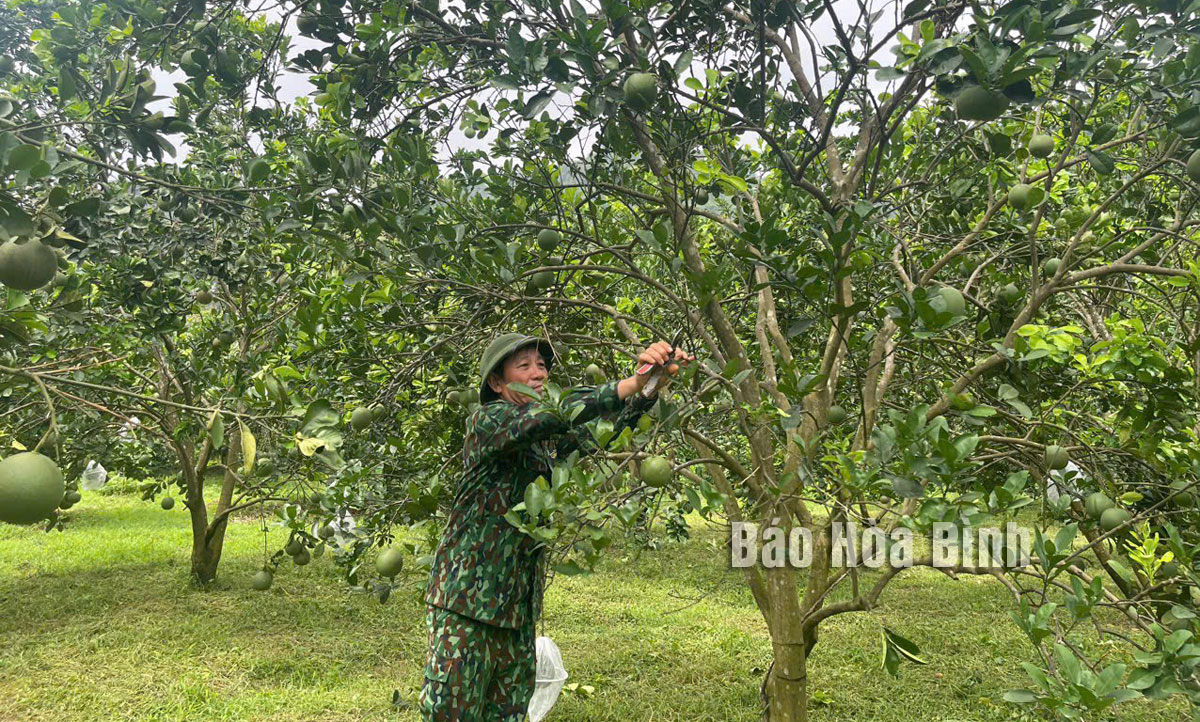
Luong Son district of Hoa Binh province has focused on building model residential areas and model gardens to help local people promote their role in building new-style rural areas and civilised urban areas, thus maintaining its status as a new-style rural district.
Local households in Thanh Ha village of Thanh Cao commune have focused on developing Dien pomelo farms towards VietGAP standards with high economic efficiency.
Concreted roads with glorious flowers along the sides leave visitors first impression when coming to Tan Hoa village of Hoa Son commune, which is the first commune recognised as a model new-style rural residential area.
Nguyen The Truyen, Secretary of the Party cell of the village, said that the village has 127 households with a per capita income of 56 million VND (2,203 USD). Three local household have had their gardens meeting the standards of model gardens.
Ha Huy Tu, the owner of a model garden covering an area of more than 5,000 sq.m in the village, said that he has divided his garden into separated areas for vegetable and fruit tree cultivation and breeding. The entire farming area has a drip irrigation system, while the breeding area has a waste treating system using biotechnology to ensure environmental protection.
Hoa Son is one of the first communes of Luong Son district to be recognised as a new-style rural area. The commune has seen great improvements thanks to local people's active engagement and contributions to the construction of a cultural house, village gates, power transmission lines, roads and camera installation.
Hoa Son is not the only locality in Luong Son to show strong performance in building model new-style rural areas and model gardens.
Dinh Duy Hung, Chairman of the People’s Committee of Luong Son town, said that since the town launched the movement to build model residential areas and civilised urban areas towards the goal of completing criteria for a ward-level urban area, it has received active and positive response from local people, especially in widening roads, cleaning streets and installing security camera systems. Particularly, the living conditions of residents have been greatly improved, he noted.
So far, the district has had 28 model residential areas and 54 model gardens meeting criteria stated in the provincial People’s Committee’s Decision No. 2188/QD-UBND.
This year, the locality is striving to have at least two additional model new-style rural residential areas and three more model gardens.
Bui Thi Ninh, Deputy Head of the Division of Agriculture and Rural Development of Luong Son, said that during the implementation of the campaign to build new-style rural areas and civilised urban areas, the district has focused on developing model new-style rural residential areas and civilised urban residential areas as well as fulfilling criteria directly relating to local people's life quality such as employment, income, and cultural identity preservation and promotion, environmental protection, and security.
The district has promoted the role of the community in choosing the most suitable methods to build model residential areas, she stressed.
In Hoa Binh province, 11 traditional craft villages with more than 400 small-scaled production households have put in place a clean and green production model, establishing new standards for sustainable development. Waste collection sites and wastewater treatment facilities have been meticulously managed by local residents.
To make it easier for the residents to handle administrative procedures, Yen Bong Commune (Lac Thuy District) has identified the administrative reform as one of its key tasks. By implementing a range of synchronized solutions, the commune has seen the positive changes in the administrative reform, meeting the needs of its people.
Mai Chau district has firmly established itself as a standout destination on Vietnam’s tourism map, attracting both domestic and international visitors with its breathtaking landscapes, rich ethnic culture, and warm hospitality. However, beyond its natural and cultural charm, a secure and well-managed tourism environment has added to Mai Chau’s appeal.
As Vietnam enters a new phase of economic and administrative reform in 2025, Hoa Binh province is stepping up its efforts to streamline governance, boost economic growth, and attract investment.
The Hoa Binh provincial People's Committee held its monthly meeting on March 26 to review the progress of key projects, assess budget revenue and public investment disbursement, provide feedback on draft documents for submission to the provincial Party Committee's Standing Board, and discuss other important matters related to the committee's governance activities.
Playing a key role in Hoa Binh province’s economic development, Luong Son district has been focusing on science and technology development, innovation, and digital transformation.



